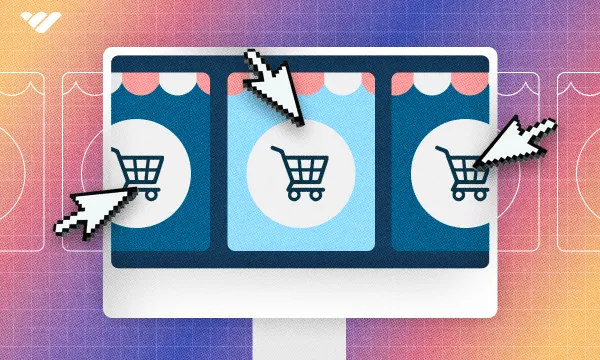Whether you're a beginner looking to sell digital products or a seasoned retailer eyeing international growth, choosing the right multi-vendor platform can make or break your ecommerce business.
With so many options out there, finding one that matches your product category, target market, and budget can feel overwhelming.
In this guide, we'll break down everything you need to know to find the perfect fit, from cost structures to fulfillment options. So, get ready to learn all about multi-vendor ecommerce platforms and discover the top 10 best options available today.
What is a multi-vendor ecommerce platform?
Multi-vendor ecommerce platforms are online marketplaces where multiple sellers can list and sell their products to customers.
These platforms allow vendors to create their own storefronts, where they can manage inventory, set prices, and handle customer interactions independently (depending on the features of each platform).
The marketplaces themselves typically handle broader functions like payments, security, and overall marketing visibility.
Some key features of multi-vendor platforms include:
- Seller Management: Multiple vendors can register and set up shop, each managing their inventory, pricing, and product listings.
- Admin Control: The platform owner (the company who made the platform) has control over vendor management, including approving sellers, managing fees, and overseeing marketplace rules.
- Customer Access: Shoppers can browse products from various sellers, compare prices, and make purchases from different vendors in one transaction.
These platforms are ideal for entrepreneurs and business owners seeking to reach a larger audience without needing their own website. Some ecommerce website builders, like Shopify or Wix, can function as multi-vendor platforms as well with specific app integrations.
How to find the best multi-vendor platform for your business

To find the best multi-vendor platform for your business, it’s important to look beyond surface-level features and dive into the details that align with your unique needs and goals.
To find the best marketplace for your business, first you need to:
Understand your business model
Your first step is understanding exactly what you plan to sell. If you specialize in physical products—such as clothing, electronics, or home goods—you’ll need a platform that supports robust inventory management and shipping options, like Amazon or Ebay.
For digital products like online courses, ebooks, or software, you’ll want a platform that easily handles production and access to digital files.
Some platforms cater specifically to certain industries (e.g., handmade goods, digital memberships), while others are more generalist. Ensuring the platform can handle your specific product needs without complicated workarounds will save you time and frustration.
Identify your target audience
Knowing who your customers are and where they shop is crucial. If your business caters to a regional market—whether local, national, or international—you’ll need to choose a platform that aligns with that geographical scope. Facebook Marketplace, for example, is ideal for local sales.
For businesses targeting niche audiences, choosing a platform that caters to a more focused community might be beneficial. On the other hand, if you’re aiming for mass-market appeal, a platform with a global presence and a large, diverse customer base might offer the scale you need.
Also, consider language and currency support if you’re selling internationally.
Analyze competition and market saturation
Popular platforms may give you access to a large customer base, but that also means you're competing with countless other sellers.
In certain categories like fashion or electronics, large platforms can be flooded with options, making it harder to stand out unless you offer something unique, whether that’s pricing, branding, or niche products.
Consider your competitive advantage—do you have a unique product that sets you apart, or do you rely on competitive pricing?
In highly saturated markets, it may be worth looking for platforms where your niche is less crowded, giving you a better chance of visibility and growth.
Conversely, larger platforms often come with more advertising options that can help you boost your visibility if you have the budget for it.
Evaluate fees and costs
Each platform operates with different pricing models, so thoroughly examine all potential fees. This includes listing fees, transaction fees, subscription costs, and payment processing fees.
For some businesses, upfront costs may be manageable, but if you operate with low margins, hidden fees (like commission percentages or shipping costs) can significantly eat into profits.
It’s also important to factor in any additional services you might require, such as advertising or premium seller support. Some platforms offer these features for free or as part of a package, while others charge extra.
By understanding how the fee structures align with your revenue model, you can better forecast long-term costs and profitability.
Assess fulfillment and shipping capabilities

Depending on whether you plan to handle shipping yourself or outsource it, the platform’s ecommerce fulfillment options are a key factor. Platforms offering integrated fulfillment services, where they handle everything from warehousing to shipping and customer returns, can simplify logistics significantly.
This is especially valuable for businesses that deal with large volumes or complex shipping requirements.
For smaller businesses or those that want to maintain control over their shipping, you’ll want to ensure that the platform supports easy integration with your preferred carriers or dropshipping partners.
Additionally, consider shipping costs, speed, and tracking capabilities. Delays and costly shipping can harm customer satisfaction, so it’s essential to choose a platform that helps you optimize these aspects.
Of course, this specifically applies to businesses where shipping is an option, as businesses focused on selling digital products don’t need to worry about shipping.
Top 9 best multi-vendor ecommerce platforms
Here are the best multi-vendor ecommerce platforms around for your business.
1. Marketplacer
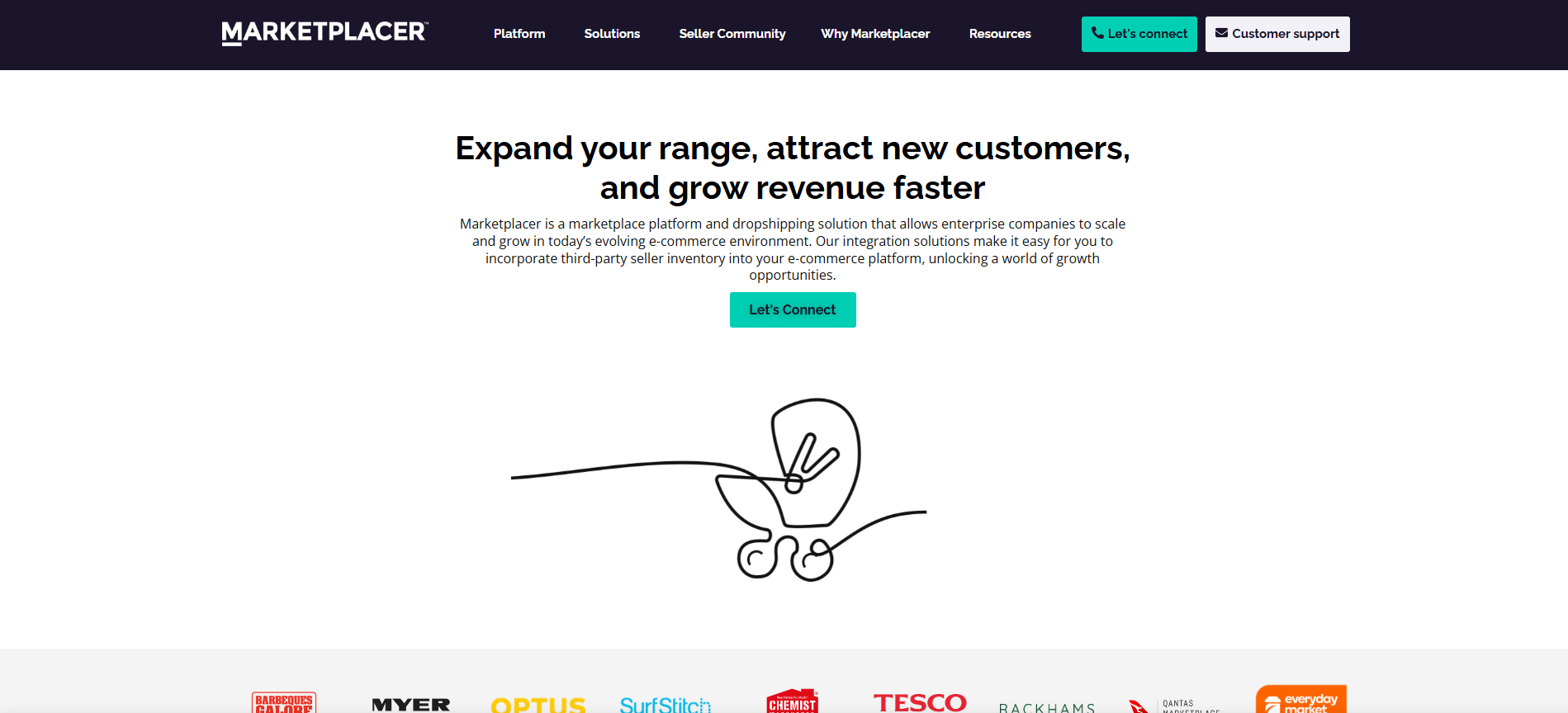
Marteplacer is a multi-vendor platform designed for both product and service-based businesses that allows you to build scalable online marketplaces. The platform stands out for its robust infrastructure, being capable of supporting everything from customer management to payment processing.
Marketplacer is better if you’re looking to create large-scale marketplaces with multiple features, allowing you to shape your platform to meet the specific selling needs of your business.
Pros:
- Strong B2B functionality for large-scale operations.
- Excellent customization options for diverse industries.
Cons:
- Pricing can be high for smaller businesses.
Best for: Large businesses looking to create feature-rich, scalable B2B marketplaces.
2. Shipturtle
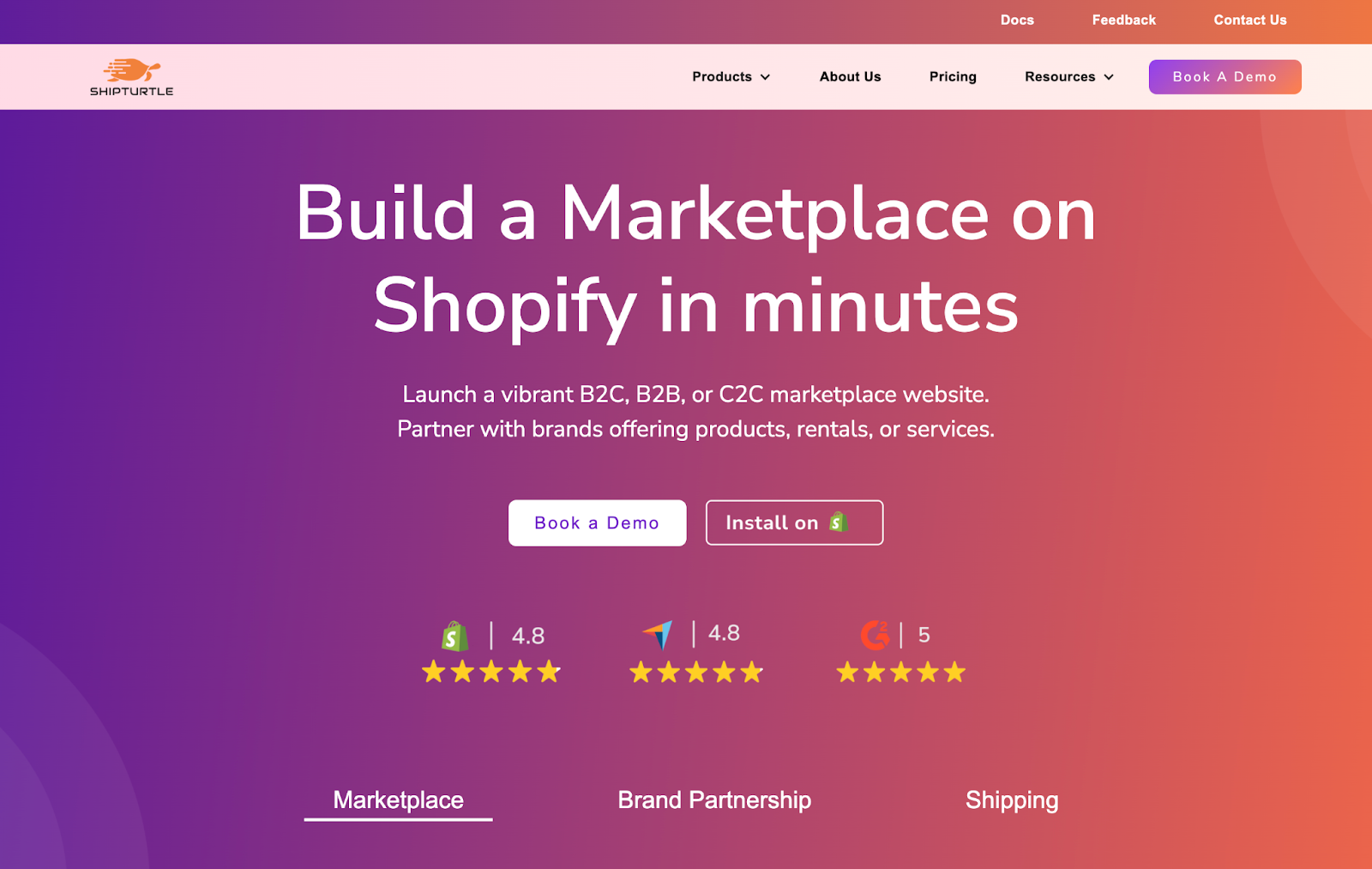
Offering strong fulfillment and management capabilities, Shipturtle’s main appeal lies in its automated vendor features. This multi-vendor ecommerce platform ensures smooth transactions and logistics, also being highly integrable with popular ecommerce platforms such as Shopify and WooCommerce.
Shipturtle is designed to streamline shipping and vendor coordination while also giving sellers the flexibility to manage orders from different vendors in one place. It’s a solid platform if your business is focused on fulfillment and order tracking.
Pros:
- Great for automating vendor operations and fulfillment.
- Seamless integrations with major ecommerce platforms.
Cons:
- Limited in customization compared to more robust platforms.
Best for: Businesses looking to automate logistics and order management.
3. Dokan Multivendor Plugin
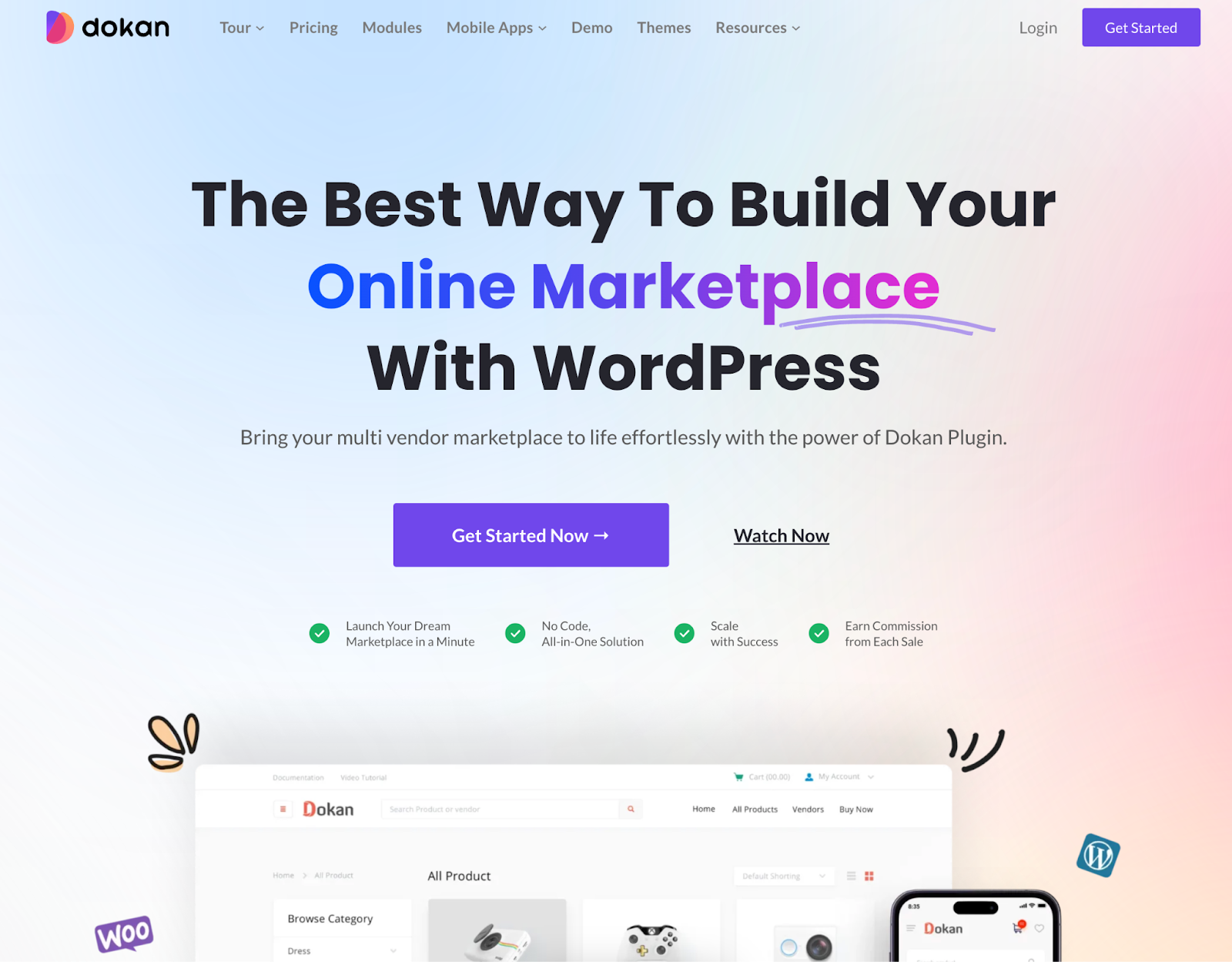
Dokan is a popular WordPress plugin that transforms WooCommerce into a full-fledged multi-vendor marketplace. Being known for its ease of use and extensive range of features, Dokan allows you to easily manage your storefront, orders, and many other aspects of your business.
Despite that, Dokan is not suited for large enterprises looking for quick scalability, since it’s a platform more suited for small to medium sized businesses.
Pros:
- Affordable and easy to use for WordPress users.
- Strong vendor management features.
Cons:
- Limited scalability for larger enterprises.
Best for: Small to medium-sized businesses looking for a budget-friendly platform that offers an option for a marketplace building app without high development costs.
4. Yo!Kart
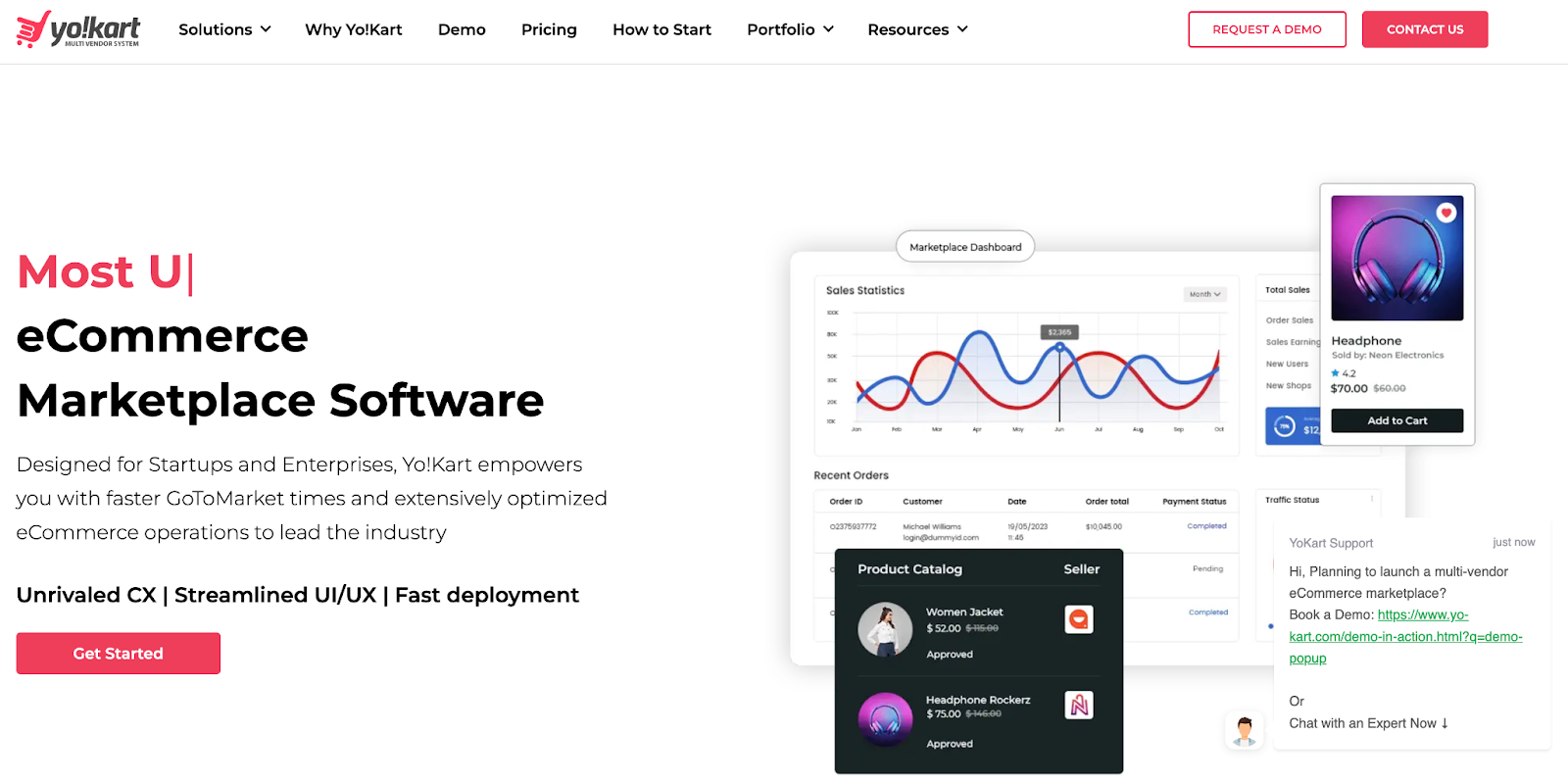
Yo!Kart comes with a rich set of features designed to cater to wholesalers, distributors, and other B2B-focused companies This platform is highly customizable and offers high scalability, making it a strong choice for growing businesses.
But one key strength of Yo!Kart, though, is its flexibility, offering support for both B2B and B2C marketplaces.
Pros:
- Excellent for B2B with robust vendor and product management features.
- Offers support to multiplace languages and currencies, facilitating global reach.
Cons:
- Higher setup costs than plug-and-play platforms.
Best for: Wholesalers, distributors, and global businesses looking for a scalable marketplace solution.
5. Whop
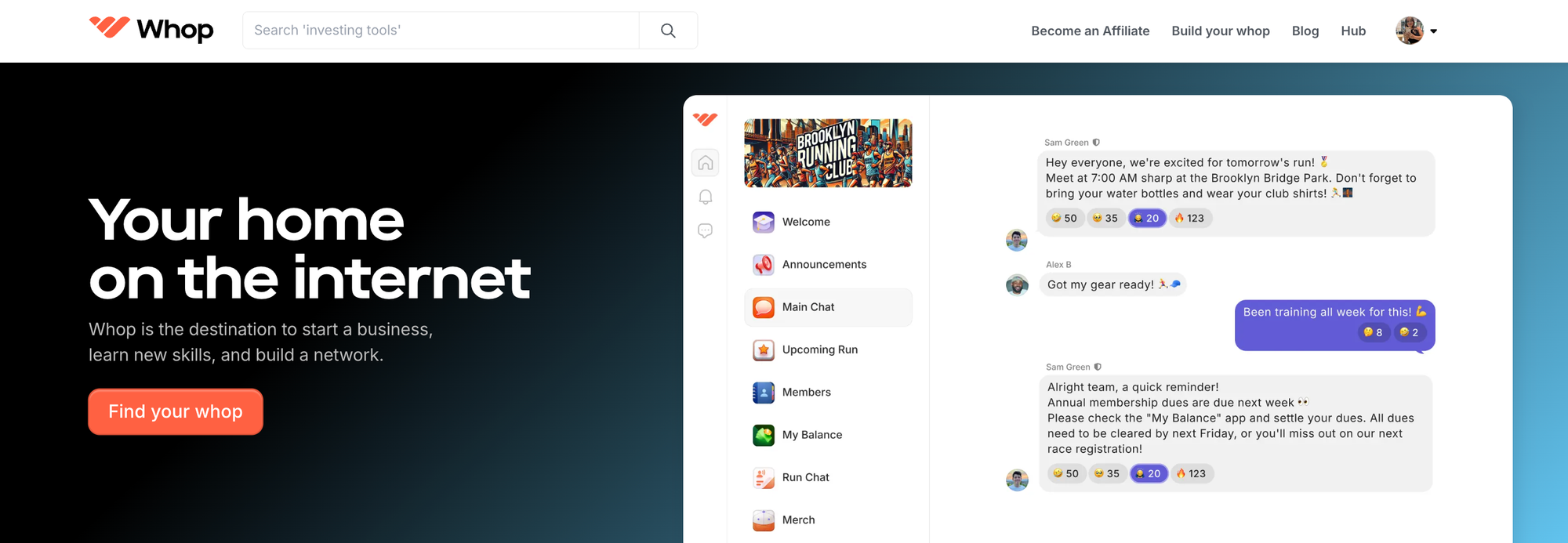
Whop is a growing platform designed for sellers who want to market digital products like guides, online courses, and memberships. What sets Whop apart is its focus on digital content, making it ideal for creators in ecommerce, SaaS, and many more.
It has a user-friendly interface, making it easy for sellers to set up their stores without much technical experience.
It also offers customizable tools and an efficient marketplace for digital creators. Whop boasts various integrations, streamlining tasks like payment processing and customer management. Also, Whop has no subscription fees and instead takes a cut of your revenue, only making money when you make money.
Pros:
- Great for digital products like software and online memberships.
- Customizable tools for easy store management.
- Focus on digital creators, making it niche-friendly.
Cons:
- Relatively young, with less brand recognition compared to larger platforms.
Best for: Digital creators, ecommerce entrepreneurs, and educators looking to sell courses or community subscriptions.
6. Mirakl
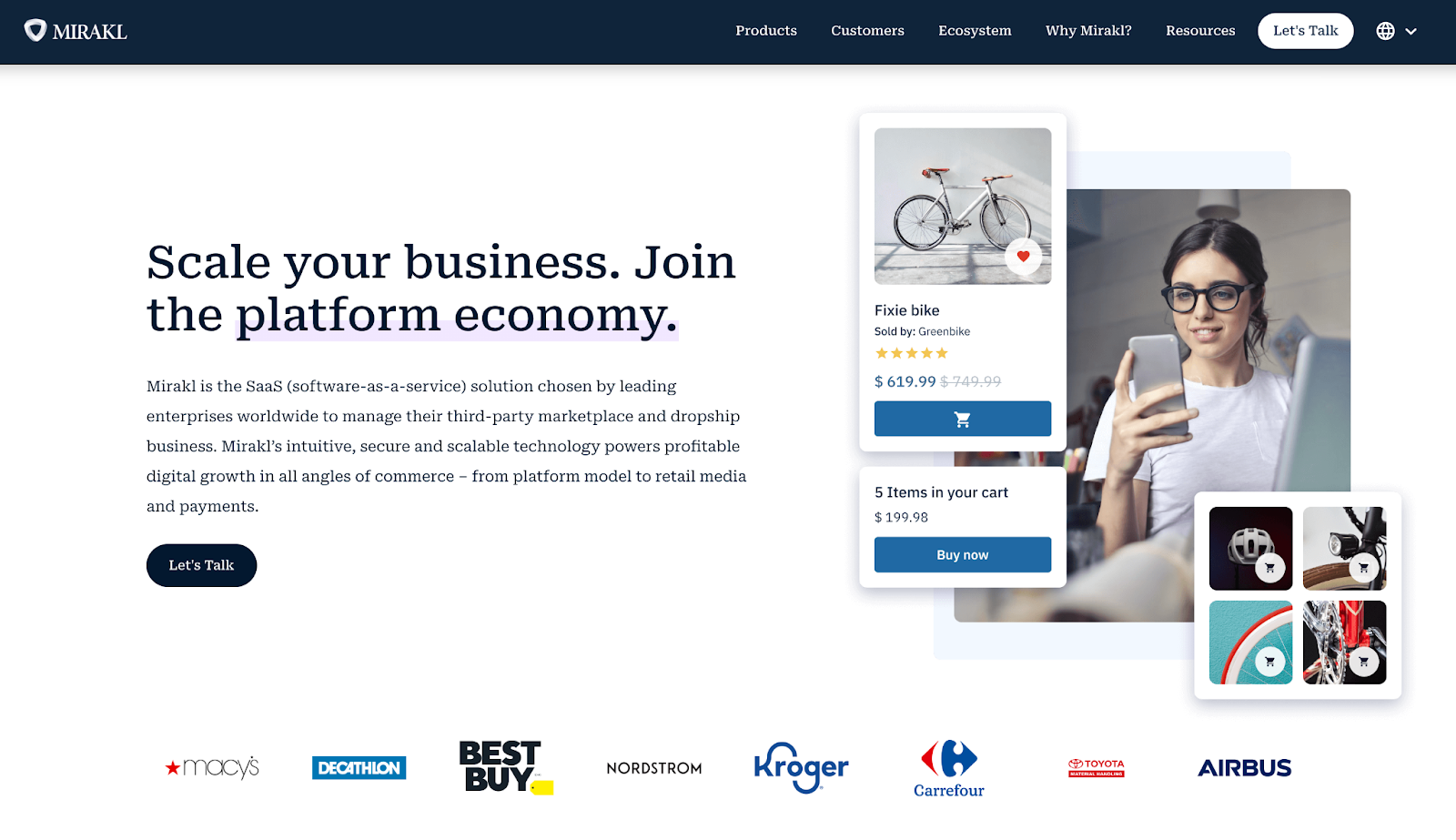
Mirakl is one of the leading platforms for building large-scale marketplaces, trusted by some of the biggest names in the industry, like BestBuy, Carrefour, and Toyota.
This multi-vendor ecommerce platform offers a powerful framework for managing complex operations on an enterprise scale. It’s also highly customizable, with strong integration capabilities and efficient support for both B2B and B2C models.
Pros:
- Powerful platform with enterprise-level features.
- Supports both B2B and B2C operations.
Cons:
- Best suited for large businesses due to high costs and complexity.
Best for: Large enterprises needing a scalable, customizable marketplace for managing complex vendor relationships.
7. Spryker
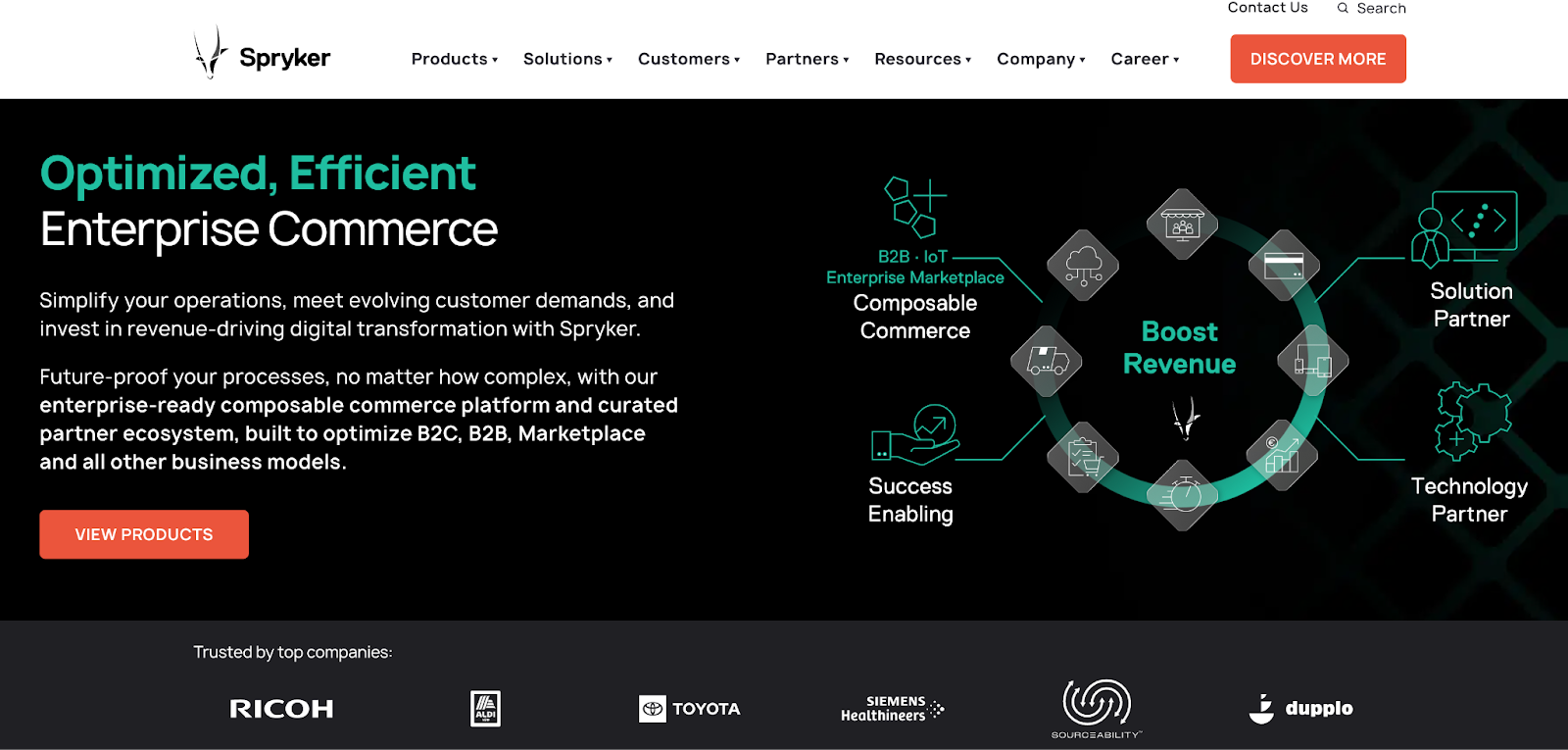
Known for its ability to support complex transactions, Spryker is a platform that allows you to tailor your marketplace to the specific needs of your business. Its modular approach includes features like advanced catalog management, customized pricing structures, and efficient vendor collaboration through integrations with other platforms.
Spryker is a multi-vendor ecommerce platform designed for scalability. So if you’re planning to build a marketplace that can evolve alongside your operations, Spryker is a good option for your business. Despite that, it can be fairly complex for setup if you don’t have a more advanced technical expertise.
Pros:
- Highly customizable with a modular architecture.
- Advanced functionalities for complex business to business transactions.
Cons:
- Requires technical expertise for setup and customization.
Best for: Growing businesses looking for a customizable B2B marketplace with complex needs.
8. OroCommerce
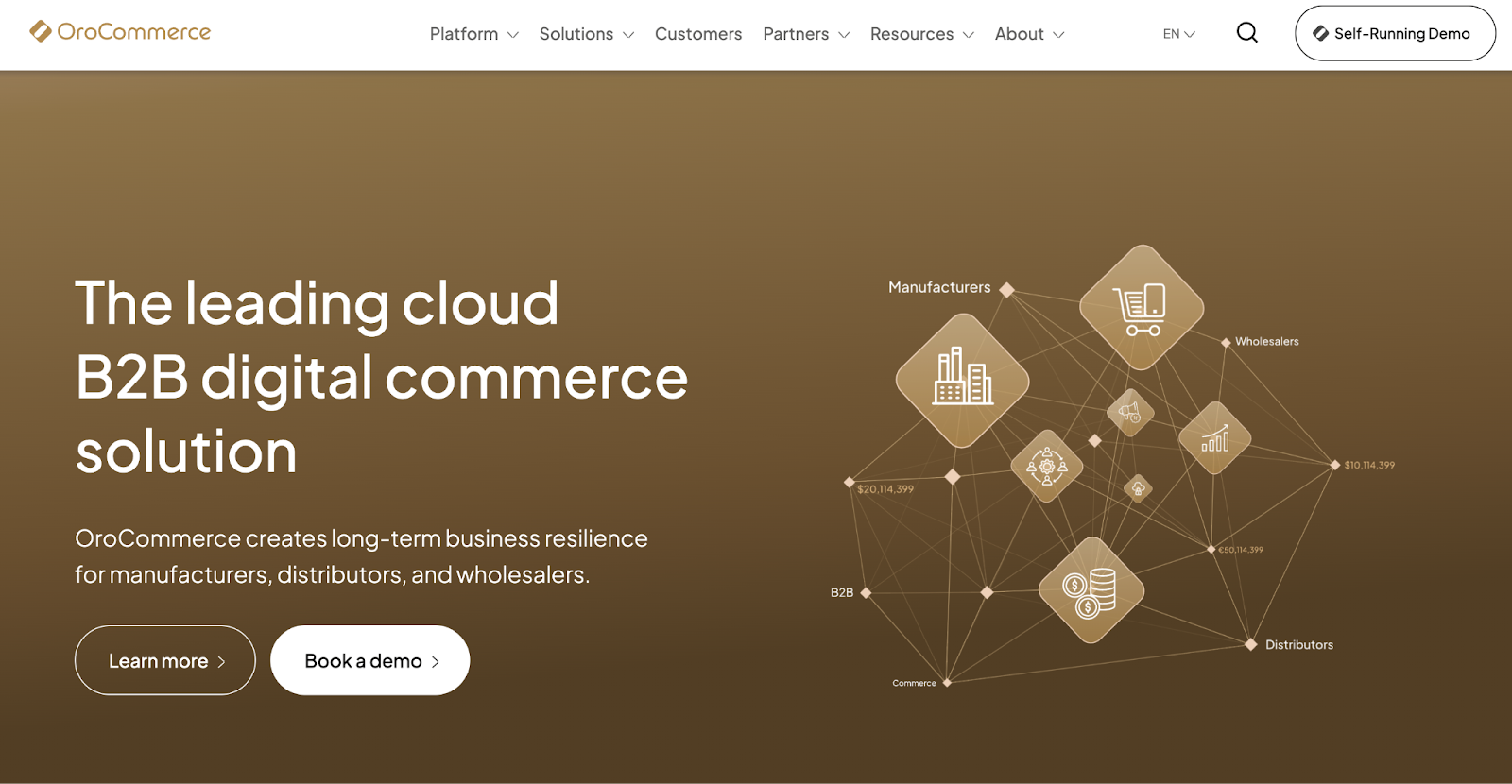
With strong focus on wholesale and enterprise-level functionalities, OroCommerce is a platform designed to offer a wide range of tools specially made for complex pricing, large orders, and vendor management.
It's an ideal solution for companies that need flexible and advanced features to manage complex sales cycles with support for multi-channel selling and even AI & Machine Learning.
With many features, one drawback of OroCommerce is its higher cost and complexity of use compared to other multi-vendor ecommerce platforms.
Pros:
- Built specially for B2B with advanced vendor and pricing features.
- Offers cutting-edge technology for handling complex, large-scales transactions.
Cons:
- Prices can be a bit high for small businesses.
- The more advanced features can be complex for inexperienced users to set.
9. Webkul
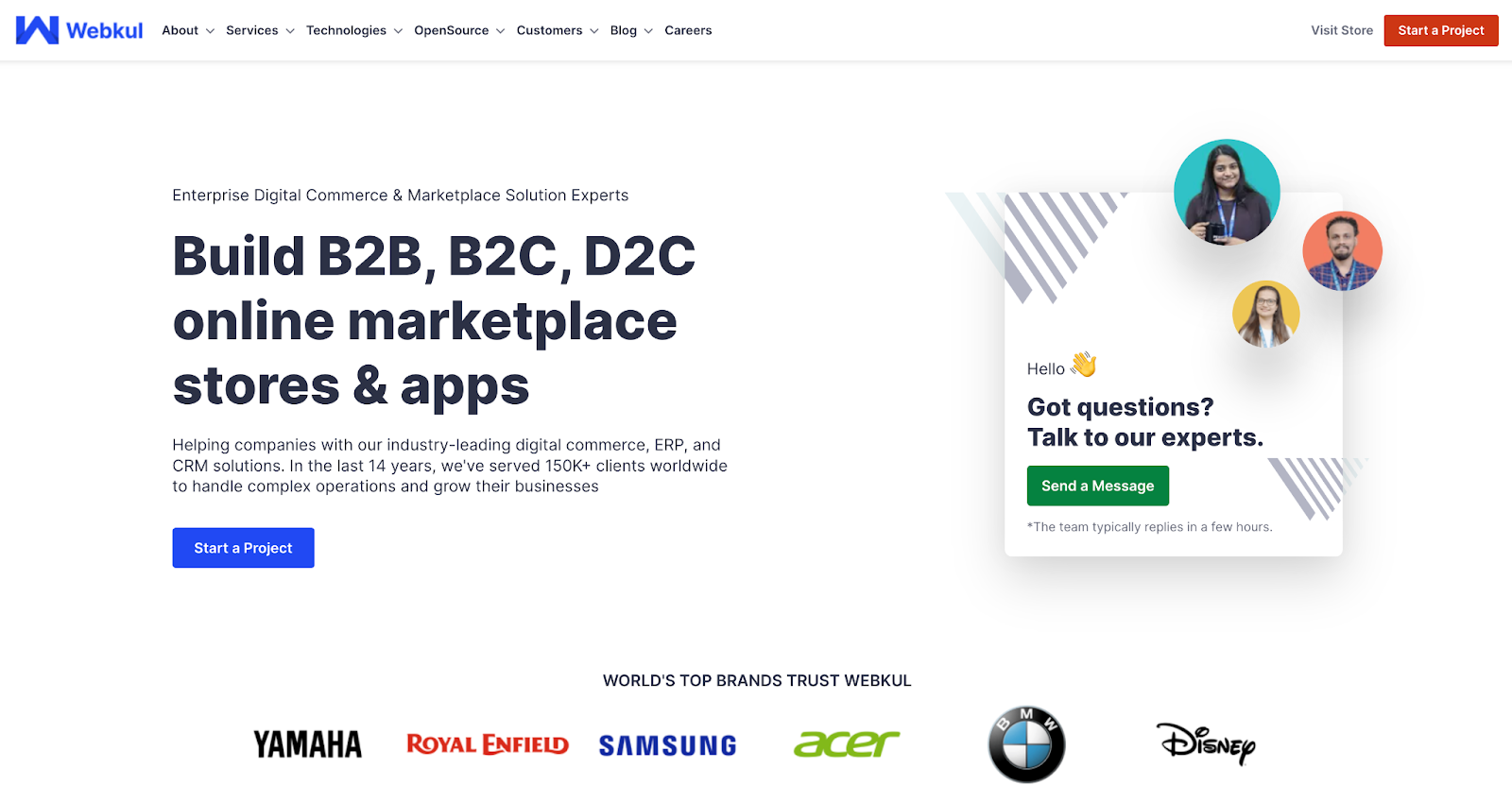
Webkul is a highly flexible, customizable multi-vendor ecommerce platform and service provider known for its vast range of technical and integration options. It’s used by thousands of clients worldwide to handle complex operations and grow their businesses.
It caters to businesses looking for deep customization, having robust management features that helps your business offer a quality and wide range of products, seamless payment options, timely shipping solutions, and positive customer support, among other things.
Pros:
- Excellent customization options with wide platform support.
- Strong B2B functionality with robust vendor management.
Cons:
- May require technical expertise for full customization.
Best for: Businesses needing a highly customizable, platform-agnostic marketplace for B2B transactions.
Want to sell digital products? Whop is your best option
Whether it’s an online course, ebook, paid community or other service like tutoring or coaching, Whop helps you create, promote, and monetize your online products turning your knowledge into a profitable business. Thousands of experts can attest to how Whop is the best platform to sell your digital ideals on the internet.
Of the various marketplaces shown in this article, Whop is the platform that offers the best options because with Whop you can start your business for free—no subscription fees required. This will keep more money in your pocket so that you can grow your business more. So, ready to start your new venture? Join Whop today!
Multi-vendor ecommerce platform guide FAQs
The most frequently asked question about multi-vendor platforms.
What is a multi-vendor ecommerce platform?
A multi-vendor ecommerce platform allows multiple independent sellers to list and sell products on a shared marketplace. Customers can browse products from different sellers, and the platform handles transactions, shipping, and often marketing.
Why you should trust us
Joe Niehaus is an ecommerce expert and content writer at Whop, with extensive experience managing affiliate programs for online brands. His insights have been featured in top publications like Business Insider, GQ, and Travel + Leisure, showcasing his deep knowledge of the industry.
